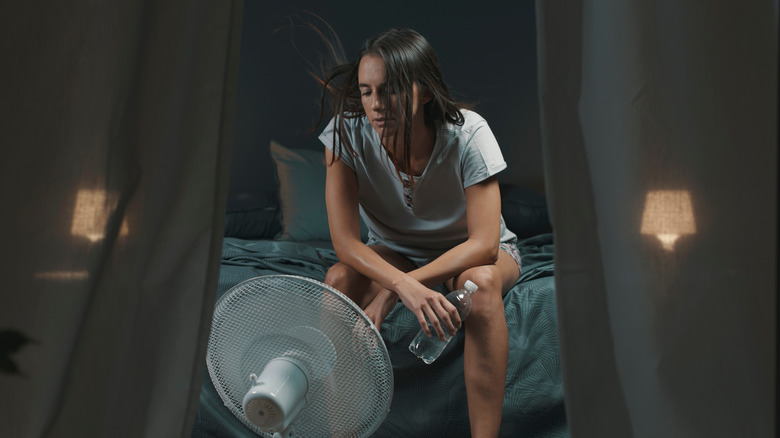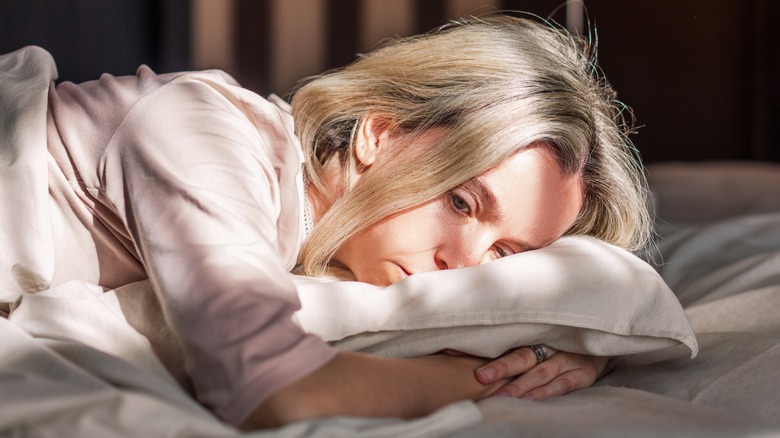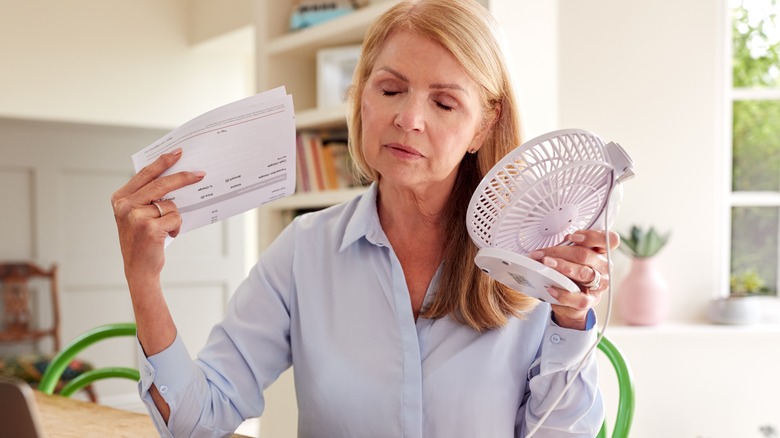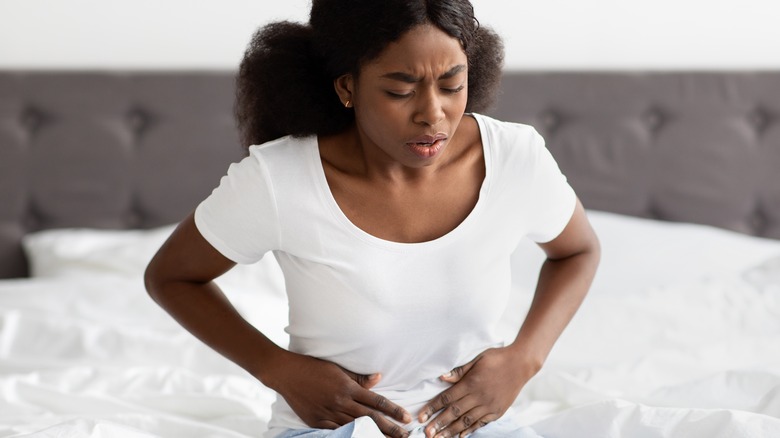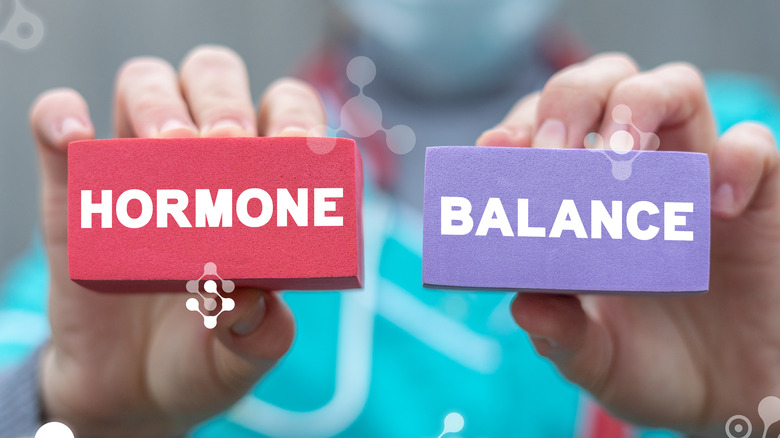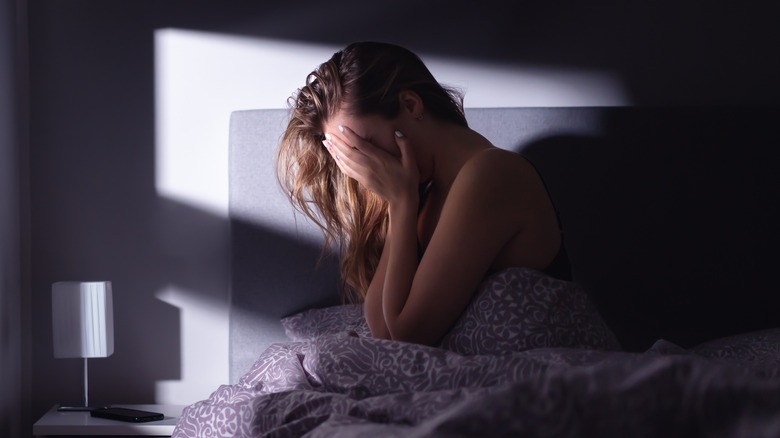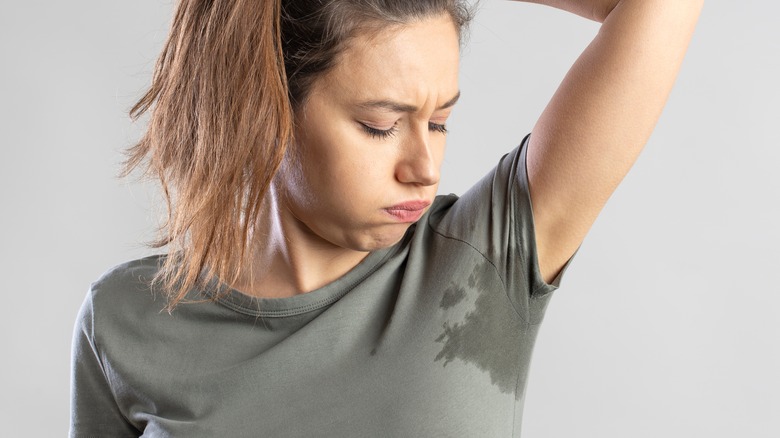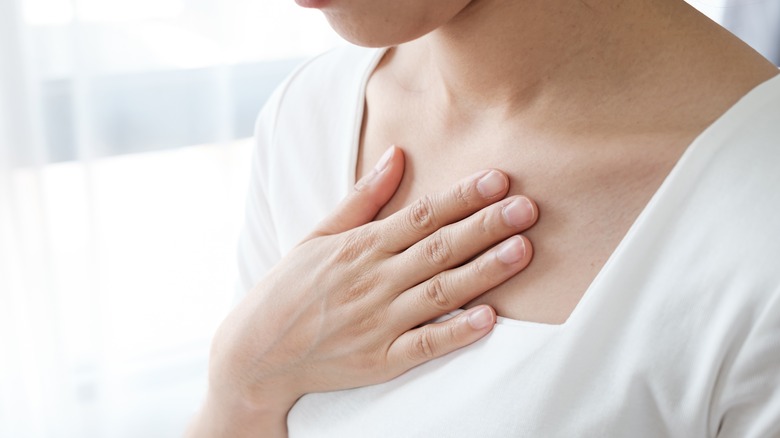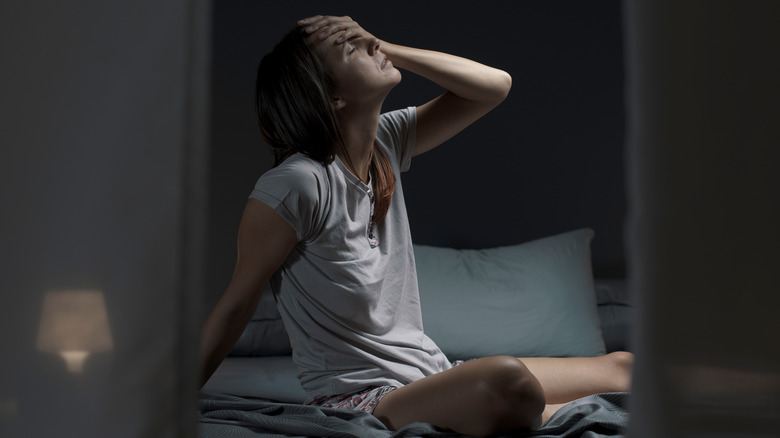Reasons You Could Be Sweating When You Sleep
Waking up bathed in sweat during the night is no fun. Wet pajamas, sticky sheets, and cold, clammy skin is uncomfortable and makes it hard to get the sleep you need to feel awake and refreshed the next morning. It can also be alarming if it happens on a regular basis.
Sweating in your sleep every once in a while isn't anything to be concerned about. Maybe you underestimated evening temperatures and loaded up on blankets, or you set the thermostat too high. Or perhaps you had a night out with friends and drank a little too much alcohol, which can raise your skin temperature and make you sweat during the night (via WebMD).
Frequent night sweats are a different story, though. Sometimes, it's nothing to worry about, and can be solved by changing your sleep environment or evening habits. Other times, there may be a more serious problem, such as out-of-whack hormones, that may need medical attention. If you want to get to the root of your sweaty sleepless nights and find a solution, read on for more info on what may be causing your night sweats and potential solutions.
Sleep environment
The most common cause of sweating when you sleep is your environment. Sleeping in a room that's too hot can make you sweaty. If you set your thermostat too high, pile on the blankets, or sleep in pajamas that are too heavy, you'll overheat; your body will attempt to cool down via sweat. According to the Sleep Foundation, the ideal temperature for sleeping is 65 degrees Fahrenheit. Michelle Dyrup, PsyD, told the Cleveland Clinic that 60 to 67 degrees Fahrenheit is a good range to aim for — lower in the range if you tend to "sleep hot."
Admittedly, that may seem pretty cold. Per experts at Stan's Heating, Air, and Plumbing, 70 to 75 degrees is the most popular setting for home thermostats. But setting it a few notches lower can make the difference between sweet sleep or sweaty somnolence. You'll want to balance this with your energy costs: Keeping your thermostat at 60 degrees in the winter can save you money, but in the summer, that can cost a pretty penny. Adjust your bedding accordingly, switching out a light summer blanket for a heavy comforter in winter.
Next is your bedding and night clothes. A mattress, sheets, or pajamas that don't "breathe" can trap heat and make you sweaty. Per The Sleep Doctor, silk, cotton, and bamboo are breathable fabrics that can help keep you cool. You can also find "sleep performance fabrics" that may be a blend of these materials designed for hot sleepers.
Menopause and perimenopause
Menopause is a natural part of a woman's lifecycle, typically occurring between the ages of 45 and 55 (via the National Institutes of Health). Technically, menopause begins one year after a woman has her last period. Part of the menopausal transition is called perimenopause. This is a period of years in which the body is preparing to transition. The entire transition can take seven to 14 years.
Most women will experience some uncomfortable symptoms during this time, which are a result of fluctuations in the hormones estrogen and progesterone. Hot flashes, or flushes, are the most common, according to Johns Hopkins, affecting about 75% of women. Hot flashes are characterized by short bouts of intense increases in body temperature that can cause you to break into a sweat without notice.
When hot flashes happen at night, they're called night sweats. They can occur multiple times in one night, making it hard to get enough quality shut-eye (via the Australian Menopause Centre). About 80% of perimenopausal women will experience night sweats for up to two years (per Johns Hopkins). If your night sweats are preventing you from getting a good night's sleep, talk with your doctor. Hormone replacement therapy and lifestyle changes (e.g., exercising; avoiding alcohol, spicy foods, and smoking; making sure you have a comfortable sleep environment) can help. Some prescription medications, including certain antidepressants, may also help relieve symptoms (per Harvard Health Publishing).
PMS
Pre-menstrual symptoms also causes changes in hormones and cause night sweats. It may be more likely to happen to you as you move into your 30s and 40s, even if you have not yet reached perimenopause (via Healthline). When progesterone levels rise and estrogen levels fall around the time of your period, it affects your hypothalamus, the area of your brain in charge of controlling body temperature. Your brain may overreact to even small temperature fluctuations, causing you to break into a sweat for no reason.
There are many other explanations for night sweats, but if they always happen at a certain point in your cycle, you can be pretty sure it's PMS-related. Keep a journal and track your sweaty nights to be sure. You need a good night's sleep, especially during your period, to fend off the other symptoms of PMS, including fatigue, mood changes, and headaches (via the NHS). It's important to take steps to prevent or lessen the impact of your night sweats by controlling your alcohol and caffeine intake, avoiding spicy foods, keeping your room cool at night, getting regular exercise, and staying well-hydrated. You can also keep some cold water on your night table and an ice pack under your pillow for immediate relief.
If your night sweats are severe, talk to your doctor. Some medications, including birth control, can help control PMS symptoms so you can get a good — and dry — night's sleep (via WebMD).
Other hormonal issues
Estrogen and progesterone are the main hormones responsible for night sweats in women around the time of menstruation and menopause. However, there are many other hormones in the body that can affect the way your body regulates heat and, therefore, cause you to sweat during the night (via Cleveland Clinic). Thyroid hormones secreted by the thyroid glands are involved in thermogenesis, or heat production (via the NIH). When your thyroid is overactive (hyperthyroidism), it produces excess thyroid hormone. This can cause myriad symptoms, including increased sensitivity to heat and excessive sweating (via the Mayo Clinic).
Testosterone is the main male sex hormone that is also present in smaller amounts in women. Its primary roles in men are growth and development and encouraging sex drive and sperm production (via Harvard Health Publishing). As men age, testosterone production naturally drops. Low testosterone can have many symptoms, including low sex drive, fatigue, loss of muscle mass, depression, and irritability (via Urology Care Foundation). It can also cause night sweats.
Both of these conditions require medical treatment. For hyperthyroidism, treatment may include anti-thyroid drugs, which reduce the amount of thyroid hormones your body produces; radioactive iodine (RAI) treatment, which causes damage to thyroid hormone-producing cells, thus reducing their production; or surgery to remove all or part of the thyroid gland (via Endocrineweb). The treatment for low testosterone is Testosterone Therapy (TT), either via topical application, injection, pellets beneath the skin, oral patches, or intranasal gel.
Anxiety
Occasional bouts of anxiety are common. Maybe you're having some short-term work stress or problems in a relationship that are causing you to worry more than normal. Chronic anxiety disorder is a bigger problem, but also surprisingly common. Phobias, social anxiety, panic disorder, and generalized anxiety disorder, among others, affect around 30% of adults (via the American Psychiatric Association).
Both short-term and chronic anxiety can disrupt your sleep, causing you to toss and turn, have trouble falling asleep, or waking up during the night — sometimes, in a sweaty mess (via Calm Clinic). Not getting enough sleep can worsen anxiety, so it's crucial to find a solution to these problems. Short-term anxiety may resolve on its own with the cessation of the problem causing it. Chronic anxiety usually requires therapy and/or medication, in addition to lifestyle changes.
For both short-term and chronic anxiety that bring on night sweats, you should take the typical precautions to lower your risk of sweat-soaked sleep. Avoid alcohol and caffeine, eating spicy foods, and ensure a comfortable sleep environment. Relaxation techniques, such as practicing meditation and mindfulness, can also help.
If night sweats wake you up in the middle of the night, don't stress if you can't get right back to sleep. That pressure can increase your anxiety. Instead, get out of bed and walk around a bit. Change into dry clothes, and do something that helps you to relax before getting into bed again.
Alcohol consumption
For some people, the effects of alcohol on body temperature are immediate: Genetic variations can affect the way certain individuals metabolize alcohol, causing a flushing sensation, especially in the face, and sweating after consuming only a small amount of spirits (via Priory). In all people, alcohol causes an increase in heart rate, resulting in vasodilation — a widening of the blood vessels in the skin — which can raise skin temperature and cause you to sweat (via Medical News Today). When you drink alcohol at night, this can cause night sweats.
Alcohol withdrawal can also make you sweat at night. If you're a habitual or heavy drinker, your body becomes dependent on alcohol. If you go a period of time without it, a host of withdrawal symptoms may arise, including sweating. Alcohol withdrawal symptoms can start within just a few hours of your last sip, and they may be sustained for a few hours to a few weeks.
If you get night sweats from alcohol consumption or dependency, the best solution is to abstain from, or at least moderate, drinking. In the meantime, you can take a few steps to make sleeping more comfortable, including drinking plenty of water, keeping your bedroom cool and dry, taking a cool shower before bed, keeping your sheets clean, and avoiding loading up on heavy blankets.
Medical conditions
Some medical conditions can cause excessive sweating, which may happen at night. Many hormonal disorders are known to cause excessive sweating and night sweats, including hyperthyroidism, low testosterone, and acromegaly, which occurs when the pituitary gland overproduces growth hormone (via the Mayo Clinic). Other conditions that can cause increased sweating at night include diabetic hypoglycemia, leukemia, lymphoma, malaria, and pheochromocytoma, a rare condition in which a tumor — normally benign — grows in an adrenal gland and affects the body's endocrine system (which produces hormones).
Viral and bacterial infections can raise your body temperature and cause sweating. According to WebMD, tuberculosis is the most common, followed by bacterial infections (including endocarditis that causes inflammation in the heart valves). Other possible causes are osteomyelitis, which is bone inflammation, and an abscess, which occurs when a bacterial infection causes a mass of pus to develop either on the skin or inside the body (via the NHS). HIV infection also commonly causes night sweats. Less commonly, some neurological conditions can cause night sweats. These include autonomic neuropathy, autonomic dysreflexia, posttraumatic syringomyelia, and stroke.
The only way to determine if your night sweats are being caused by a medical condition is to see your doctor for a full medical examination and thorough medical history.
Hyperhidrosis
If you sweat a lot in conditions that don't affect others, you may be experiencing a condition called hyperhidrosis, which causes excessive sweating both during the day and at night. Excessive sweating may occur all over your body or only in certain areas, such as your armpits, face, chest, groin, and the soles of your feet or palms of your hands.
It's rather common, affecting approximately 30% of the population (via the NHS). Hyperhidrosis may or may not be caused by an underlying medical condition. On its own, it's referred to as "primary hyperhidrosis." This type doesn't pose any serious health risks, although it may be uncomfortable and embarrassing and decrease your quality of life. If it happens at night, it can also interfere with your sleep, and lack of sleep can contribute to a host of negative physical and mental impacts.
Doctors can diagnose primary hyperhidrosis in two ways: with a starch iodine test, or using a vapometer (via Johns Hopkins). Both of these measure the amount of sweat the body produces to assess whether or not it's excessive and to compare it to baseline and post-treatment. Treatment for hyperhidrosis includes oral medication and/or the use of topical creams that help dry out the skin in areas prone to excessive sweat. Dietary changes, including a vegetarian diet and supplements, can also help. Other treatments include injections of botulinum toxin to affected areas, using microwave thermolysis to eradicate overactive sweat glands, and surgery to cut the sympathetic nerve which controls sweating.
Gastroesophageal reflux disease
Gastroesophageal reflux disease (GERD) is a condition in which stomach acid backs up into your esophagus, the tube that carries food and liquids from your mouth to your stomach (via the Cleveland Clinic). Everyone experiences occasional acid reflux, but GERD is a chronic condition caused by improper closure of a valve called the lower esophageal sphincter. The most prominent effects of GERD are a burning sensation in the chest, especially after eating or at night when lying down; regurgitation of food; pain in the chest or upper abdomen; a feeling that there is food stuck in your throat; coughing, trouble swallowing; vomiting and a sore throat or hoarseness.
Another potential but less common effect of GERD is night sweats (via WebMD). The reasons GERD may cause this are unclear, but sweating is one of the ways your body reacts to any stress source (via Healthline). If you wake up at night with a burning sensation in your throat or chest, or any other GERD symptom, and you're also drenched in sweat, there's a pretty good chance those symptoms are connected.
If you think you may have GERD and that your night sweats are a result, speak with your doctor. For less severe cases, you may be able to fight off nighttime acid reflux and night sweats by avoiding eating before bed, eating smaller meals, and avoiding trigger foods (such as spicy or fatty foods). More severe cases may require medications, such as antacids or histamine blockers.
Nocturnal hypoglycemia
Hypoglycemia is a condition in which your blood sugar, or blood glucose, levels drop lower than normal (via the Mayo Clinic). People being treated for diabetes are most likely to experience hypoglycemia, but some other conditions and medications can also cause blood sugar levels to drop. When this happens at night, it's called nocturnal hypoglycemia. Sweating is a common system of hypoglycemia, so if your blood sugar drops while you're sleeping, you may wake up with damp skin, clothes, and sheets.
Among those who experience low blood sugar, nocturnal hypoglycemia is common, with nearly 50% of people experiencing it while they're asleep, according to Johns Hopkins. These episodes tend to be worse than those during waking hours. Unfortunately, nocturnal hypoglycemia can be critical; in some cases, you may not be able to wake up without medication administered by someone else. Therefore, it's crucial to take steps to prevent it.
Risk factors for nocturnal hypoglycemia include missing meals, particularly dinner; exercising too close to bedtime; consuming alcohol in the evening; and infections. Avoiding these common causes can greatly reduce your risk. If you are diabetic and have previously had nocturnal hypoglycemia, you may be prescribed a specific type of insulin called NPH to be taken at dinnertime, which takes effect 6 to 8 hours later.
Other symptoms of nocturnal hypoglycemia include shakiness, restlessness, nightmares, racing heartbeat, and breathing too fast or too slow. If you experience any of these symptoms, talk to your doctor right away.

